
ARTHROPODA SELECTA
Scope & Guideline
Unveiling the secrets of arthropod diversity.
Introduction
Aims and Scopes
- Taxonomy and Systematics:
The journal places a strong emphasis on the classification and identification of arthropod species, including detailed taxonomic notes and revisions. This focus aids in the clarification of species relationships and the establishment of taxonomic hierarchies. - Faunistic Surveys and Biodiversity Studies:
Many articles are dedicated to documenting the diversity and distribution of arthropod species across various geographical regions, particularly in Russia and neighboring areas. These surveys are crucial for understanding local biodiversity and informing conservation efforts. - Morphological and Ecological Research:
Research exploring the morphological characteristics and ecological roles of arthropods is a consistent theme, with studies often linking morphology to ecological adaptations and behaviors. - Invasive Species and Ecological Impacts:
The journal addresses the implications of invasive species within arthropod communities, contributing to the understanding of ecological impacts and management strategies. - Interdisciplinary Approaches:
Papers often integrate molecular techniques with traditional morphological assessments, reflecting a modern approach to systematics and evolutionary biology.
Trending and Emerging
- Molecular Phylogenetics and Genomics:
There is an increasing trend towards utilizing molecular techniques to resolve phylogenetic relationships among arthropods. This approach enhances the understanding of evolutionary processes and species relationships, which is becoming a cornerstone of modern taxonomy. - Ecological and Conservation Biology:
Research focusing on the ecological roles of arthropods and their responses to environmental changes is gaining prominence. This includes studies on habitat preferences, species interactions, and the impacts of climate change, reflecting a broader emphasis on conservation. - Invasive Species Research:
The journal is seeing a rise in studies dealing with invasive species, particularly their ecological impacts and management strategies. This trend aligns with global conservation efforts to address biodiversity loss caused by invasive organisms. - Integrative Taxonomy:
There is a notable increase in integrative taxonomy studies that combine morphological, ecological, and molecular data to provide a more holistic understanding of species and their classifications. This reflects a shift towards comprehensive approaches in systematics. - Biogeography and Distribution Patterns:
Emerging themes include detailed studies on the biogeography of arthropods, with a focus on distribution patterns and factors influencing biodiversity across different regions, especially in underexplored areas.
Declining or Waning
- General Morphological Studies:
There has been a noticeable decrease in publications focusing solely on general morphological studies without linking them to broader ecological or taxonomic questions. Researchers seem to favor studies that incorporate molecular data to provide a more comprehensive understanding. - Traditional Species Descriptions:
The journal has seen a reduction in papers that provide mere species descriptions without significant new insights or contributions to taxonomy or ecology. The focus has shifted towards integrative studies that combine descriptions with ecological or phylogenetic analyses. - Understudied Taxa:
Certain underrepresented arthropod groups, such as some less charismatic or less economically important species, are appearing less frequently in submissions, possibly due to shifting researcher interests towards more prominent or impactful taxa.
Similar Journals
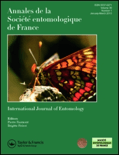
ANNALES DE LA SOCIETE ENTOMOLOGIQUE DE FRANCE
Pioneering research in ecology and entomology.ANNALES DE LA SOCIETE ENTOMOLOGIQUE DE FRANCE, published by Taylor & Francis Ltd, is a prestigious journal that focuses on the dynamic field of entomology, offering a platform for the dissemination of innovative research related to insect science and ecological systems. With an increasing impact factor and notable quartile rankings (Q2 in both Ecology, Evolution, Behavior and Systematics, and Insect Science), the journal serves as a vital resource for researchers, professionals, and students alike, stimulating advances in our understanding of insect biology and its implications for broader ecological contexts. Although it is not an Open Access journal, it boasts a strong reputation within the academic community, as evidenced by its significant Scopus rankings and a commitment to high-quality peer-reviewed content. With its extensive historical archive since 1988 and a continuous publication schedule through 2024, ANNALES DE LA SOCIETE ENTOMOLOGIQUE DE FRANCE remains an essential reference for those engaged in the study of entomology and related ecological fields. For more information, visit the publisher's site at Taylor & Francis Ltd.

ACTA ZOOLOGICA ACADEMIAE SCIENTIARUM HUNGARICAE
Empowering Scholars to Navigate the Animal KingdomACTA ZOOLOGICA ACADEMIAE SCIENTIARUM HUNGARICAE, published by the Hungarian Natural History Museum, is a distinguished open access journal dedicated to advancing knowledge across the fields of Animal Science, Zoology, Ecology, Evolution, Behavior, and Systematics. Established in 2003 as an open access platform, this scholarly journal has actively contributed to the dissemination of critical research since 1996, positioning itself within the Q3 quartile in both its primary fields as of 2023. With its ISSN 1217-8837, ACTA ZOOLOGICA serves as a vital resource for researchers, professionals, and students aiming to explore and expand their understanding of animal biodiversity and ecology. Its publication features a variety of empirical studies, reviews, and critical commentaries that rigorously address contemporary issues in zoological sciences, underlining its commitment to fostering academic excellence and environmental sustainability. Researchers can access the journal’s extensive archives to deepen their inquiry into animal life, making it an essential addition to any academic library.

European Journal of Taxonomy
Exploring the dynamic world of species classification.The European Journal of Taxonomy is a distinguished open access journal, published by the MUSEUM NATL HISTOIRE NATURELLE in France, dedicated to the rich and dynamic field of taxonomy, ecology, and systematics. Since its inception in 2011, this journal has aimed to provide a platform for the dissemination of high-quality research and innovative methods relevant to the study of biodiversity and species classification. With a commendable Q2 ranking in the Ecology, Evolution, Behavior and Systematics category as of 2023, the journal ranks 380 out of 721 in Scopus, highlighting its pivotal role in advancing scientific knowledge in these essential areas. Researchers and students alike will find valuable resources and contributions that address pressing ecological and evolutionary questions from 2015 to 2024. By promoting open access, the European Journal of Taxonomy ensures that vital research is accessible to a broader audience, fostering collaboration and discourse among professionals striving to enhance our understanding of the natural world.

Zoosystematics and Evolution
Connecting researchers to the pulse of evolution.Zoosystematics and Evolution is a premier peer-reviewed journal dedicated to the fields of animal science, zoology, and evolution, published by Pensoft Publishers. With a commendable Q1 ranking in multiple categories including Animal Science and Zoology, Ecology, Evolution, Behavior and Systematics, as well as Insect Science, this journal stands out as a vital resource for researchers and professionals engaged in the dynamic study of biodiversity and systematics. Since transitioning to Open Access in 2014, it has ensured that groundbreaking research is readily available to a global audience, thus fostering collaborative advancements and facilitating the dissemination of knowledge. The journal has a significant presence in both Scopus and various academic indices, enhancing its reputation and impact within the scientific community. Based in Bulgaria, at 12 Prof Georgi Zlatarski St, Sofia, the journal continues to thrive, contributing valuable insights that drive scientific inquiry and exploration in the ever-evolving realm of zoological research.
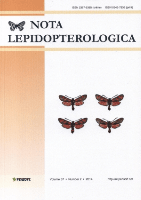
NOTA LEPIDOPTEROLOGICA
Bridging the gap between taxonomy and conservation.NOTA LEPIDOPTEROLOGICA, an esteemed journal published by Pensoft Publishers, has been a cornerstone in the fields of Insect Science, Animal Science, Ecology, and Evolution since its inception in 1995, with a commitment to open access publication since 2014. Based in Sofia, Bulgaria, this journal serves as a vital platform for researchers and professionals alike, facilitating the dissemination of significant findings related to Lepidoptera and broader ecological interactions. With an impressive scope covering vital aspects of biodiversity and taxonomy, NOTA LEPIDOPTEROLOGICA holds a Q3 ranking in its categories according to the 2023 metrics and plays a crucial role in advancing our understanding of insect science. By fostering international collaboration among scholars, the journal not only emphasizes the ecological importance of Lepidoptera but also contributes to global conservation efforts, making it an indispensable resource for students and experienced researchers aiming to deepen their knowledge in these fields.
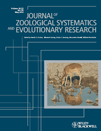
JOURNAL OF ZOOLOGICAL SYSTEMATICS AND EVOLUTIONARY RESEARCH
Transforming Insights into Evolutionary UnderstandingThe Journal of Zoological Systematics and Evolutionary Research, published by Wiley-Hindawi, stands as a premier academic journal since its establishment, showcasing cutting-edge research in the fields of Animal Science, Zoology, and Ecology. With an impressive track record spanning from 1963 to the present, this journal has earned a Q1 classification in both Animal Science and Ecology, as well as recognized rankings in Genetics and Molecular Biology. Its impact is highlighted by its Scopus ranks, placing it in the top percentile for relevant categories, underscoring its vital role in advancing knowledge and understanding within these disciplines. Researchers, professionals, and students will find a wealth of high-quality, peer-reviewed articles that contribute to the evolutionary understanding of biodiversity and systematics. Though not an Open Access journal, it remains accessible to a wide audience committed to exploring the intricacies of zoology and evolutionary biology.

Hacquetia
Empowering Ecological Research with Open AccessHacquetia is an esteemed open-access journal dedicated to the interdisciplinary exploration of ecology, evolution, behavior, systematics, forestry, and plant science. Published by SCIENTO since 2007, this journal has established itself as a pivotal platform for researchers and academics looking to disseminate their findings in these critical fields. Nestled in the heart of Warsaw, Poland, Hacquetia offers unrestricted access to its content, promoting knowledge sharing among professionals, students, and enthusiasts alike. The journal, while ranked in the Q4 category across its relevant disciplines in 2023, serves as a valuable resource for those seeking to contribute to and engage with contemporary ecological and botanical research. Its commitment to open access ensures that cutting-edge research is available to a global audience, fostering innovation and collaboration in the scientific community.
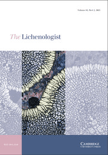
LICHENOLOGIST
Unveiling the Secrets of Lichens: Ecology, Evolution, and BeyondLICHENOLOGIST is a prestigious journal published by Cambridge University Press, dedicated to advancing the field of lichenology and promoting a deeper understanding of the ecology, evolution, and systematics of lichens. Established in 1958 and focusing on the convergence of research through 2024, this journal has established itself as a significant resource within the Q2 category of Ecology, Evolution, Behavior and Systematics. With a Scopus ranking of #316 out of 721 in its field, it highlights research that not only enhances academic knowledge but also has practical implications for ecology and conservation efforts globally. Although traditionally not an open-access journal, it provides valuable insights and contributes to the scientific community by disseminating high-quality, peer-reviewed research. LICHENOLOGIST is essential for researchers, professionals, and students looking to stay informed about the latest advancements in lichen studies, making it an indispensable resource for anyone involved in ecological and biological sciences.
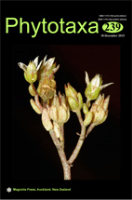
Phytotaxa
Fostering Global Insights into Plant EvolutionPhytotaxa, published by MAGNOLIA PRESS, is an esteemed journal in the fields of Plant Science and Ecology, Evolution, Behavior and Systematics. Established to cater to the growing need for high-quality research dissemination in botany, this journal presents the latest findings in plant taxonomy, systematics, and biodiversity. With its H-Index reflecting significant academic influence, and recognized as Q2 in Plant Science and Q3 in Ecology by Scopus, it stands as a reputable source for scholars and practitioners alike. The journal operates without open access restrictions, allowing for a wider reach to its audience. Positioned in New Zealand, Phytotaxa has been pivotal since its inception, contributing to the global understanding of plant diversity and ecology from 2010 to 2024. Its rigorous peer-review process ensures the high quality of published articles, making it an essential resource for researchers, professionals, and students dedicated to advancing the field of botany.

REVUE SUISSE DE ZOOLOGIE
Pioneering Insights in Zoology and BeyondThe REVUE SUISSE DE ZOOLOGIE, published by the esteemed MUSEUM HISTOIRE NATURELLE, is a premier journal dedicated to advancing the field of zoology and its related disciplines. Established in 1964, this Swiss journal has consistently provided a platform for high-quality research in the areas of ecology, evolution, behavior, and systematics, currently holding a commendable Q3 ranking in these categories for 2023. With a rich publication history spanning from 1964 to 1979 and then from 1994 to the present, it serves not only as a significant repository of knowledge but also as a crucial resource for researchers, professionals, and students alike. While the journal is not open access, it remains a vital tool for those wishing to stay at the forefront of zoological research and innovation. Its commitment to disseminating groundbreaking studies makes it an indispensable asset for academic institutions and researchers globally, ensuring that pivotal findings in zoology continue to gain visibility and impact.